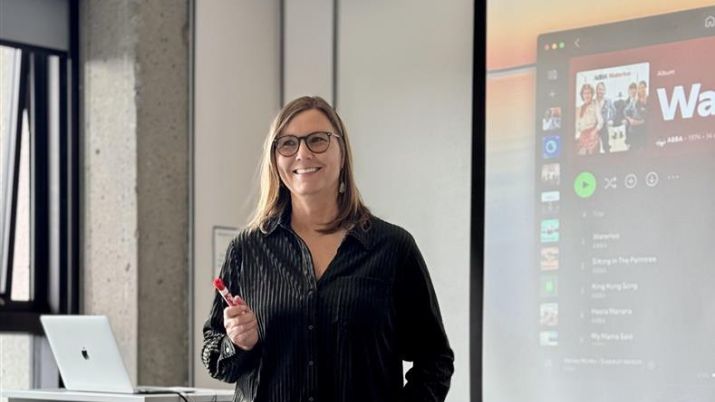Gabrielle Bonifacio is graduating with a major in Media Studies and a minor in German, with specialties in creative writing and graphic design. As a Filipino immigrant and artist, she is interested in projects that explore the act of translation, and themes of diaspora, generational love, and liminality. She is particularly excited about telling stories led by queer Filipinos, and challenging representations of marginalized groups in media.


CENES: What is your favourite German word?
Gabrielle Bonifacio: Sprachgefühl or Schatz! For me, Sprachgefühl encompasses a vivid emotion that goes beyond a literal meaning. As for Schatz, I just find it so endearing and warm.
CENES: Why did you take the German Minor?
GB: My parents encouraged me to learn the language because I had planned to do an exchange in Münich during my third year. Because I was taking so many German courses already, I looked up how many it would take for me to add it as a minor. It wasn’t an unrealistic goal alongside my other coursework and, at the time, I honestly just thought it would be good to add to my resume, so I went ahead and spoke with my academic advisor. In the end, my engagement went far beyond ‘resume’ and I was really happy with my decision to pursue another field of study.
CENES: What is your favourite thing that you studied in the German program?
GB: I really enjoyed the diverse texts that we analyzed in Advanced German (400/410) because they facilitated discussion on topics that are so important and pressing right now (eg: colonialism, gender identity etc.). Dr. Caroline Rieger’s course also pushed me to actively use German outside of class, and I’m grateful to have progressed so much with her guidance and support.
Dr. Florian Gassner’s course on German Cinema (GERM 304) was incredibly fun because he managed to blend film concepts that I had studied previously in Media Studies with a strong historical and social lens. Dr. Uma Kumar’s course truly deepened my understanding of the Holocaust from our class discussions and readings of diverse primary sources and perspectives.
Lastly, there’s something really satisfying about going from GERM 100 to GERM 410. You start from barely being able to say a sentence, to reading and discussing a scholarly article! My biggest appreciation and thanks to Alexis Clark Briley, Dr. Angelika Struch, and Sara Pashan for their engaging and encouraging teaching, which is so critical in the first two years of language-learning.
CENES: What is something you learned in German that will stay with you even after you graduate?
GB: It gave me a new lens on languages, and the ways they can be used for inclusion versus exclusion. I am much more conscious of how language structures construct meaning and how complex code-switching can be. I also found that exploring the concept of a nation’s memories and (evolving) cultural and social identities, to be incredibly powerful and unforgettable.
CENES: What will you miss most about the German program?
GB: It was honestly pretty fun to struggle and succeed alongside many kind people in my classes. The Christmas gatherings were also really sweet—lots of fun German snacks and pretty lights. I took my non-German program friends for one year and they thought it was great! Working with Dr. Ervin Malakaj and fellow Undergraduate Assistant Emilie Kneifel for the Undergraduate German program has been one of my favourite experiences in the last five years, and I will, of course, miss my amazing professors.
CENES: What would you say to anyone considering a minor?
GB: If you have even a vague interest in this, I would recommend looking into it and contacting Dr. Malakaj or a trusted professor/advisor. Consider whether it fits into your workload, and what you would gain out of it! Personally, taking a minor seriously enriched my university experience as a whole, and opened up so many cool opportunities for learning, working and traveling.
Also, I would say that it’s normal to be scared. I started taking German in second year without any prior knowledge, and I was terrified that it would be too difficult to pick up, that it would lower my GPA etc. However, after four years of taking German, I was able to go from quite literally nothing to a fairly confident B2/C1 level. You will have genuine support from your profs. and peers, so if you’re considering it, I would encourage you to take a chance and go for it!


